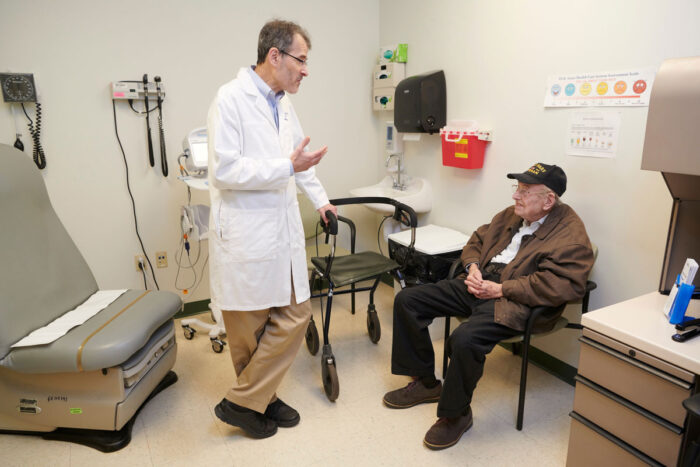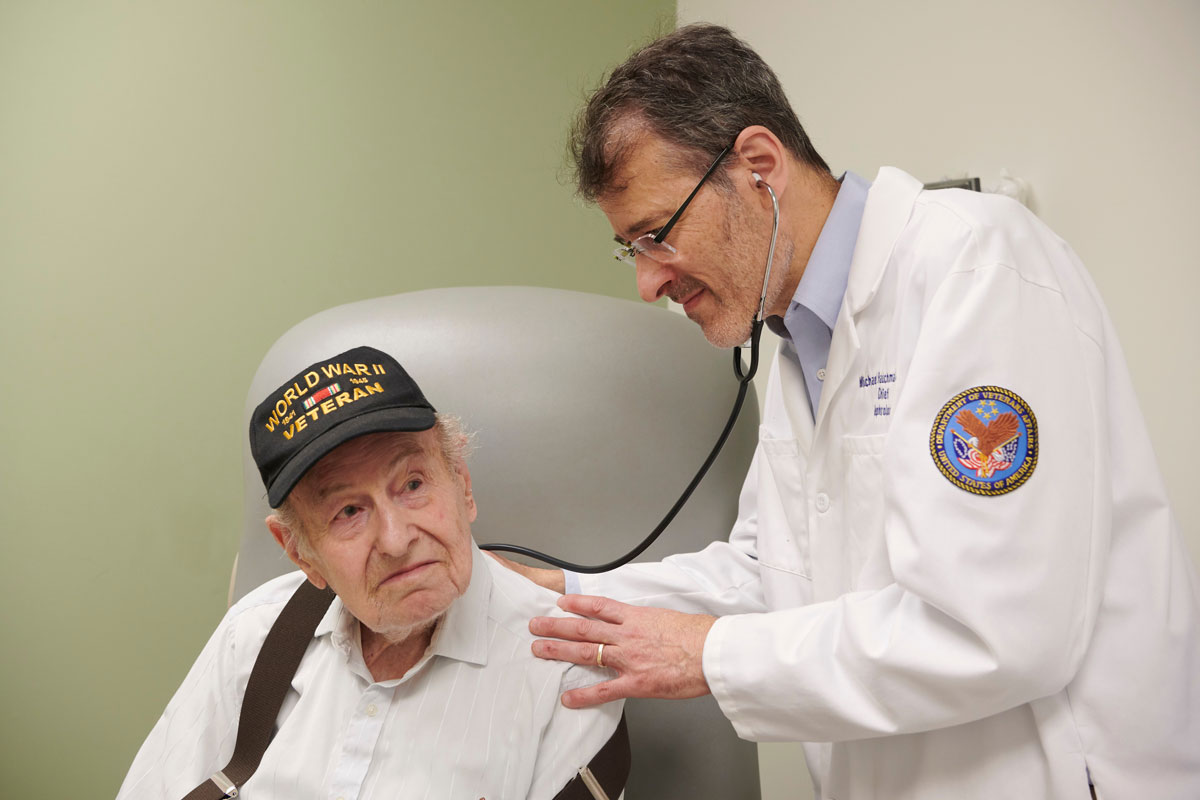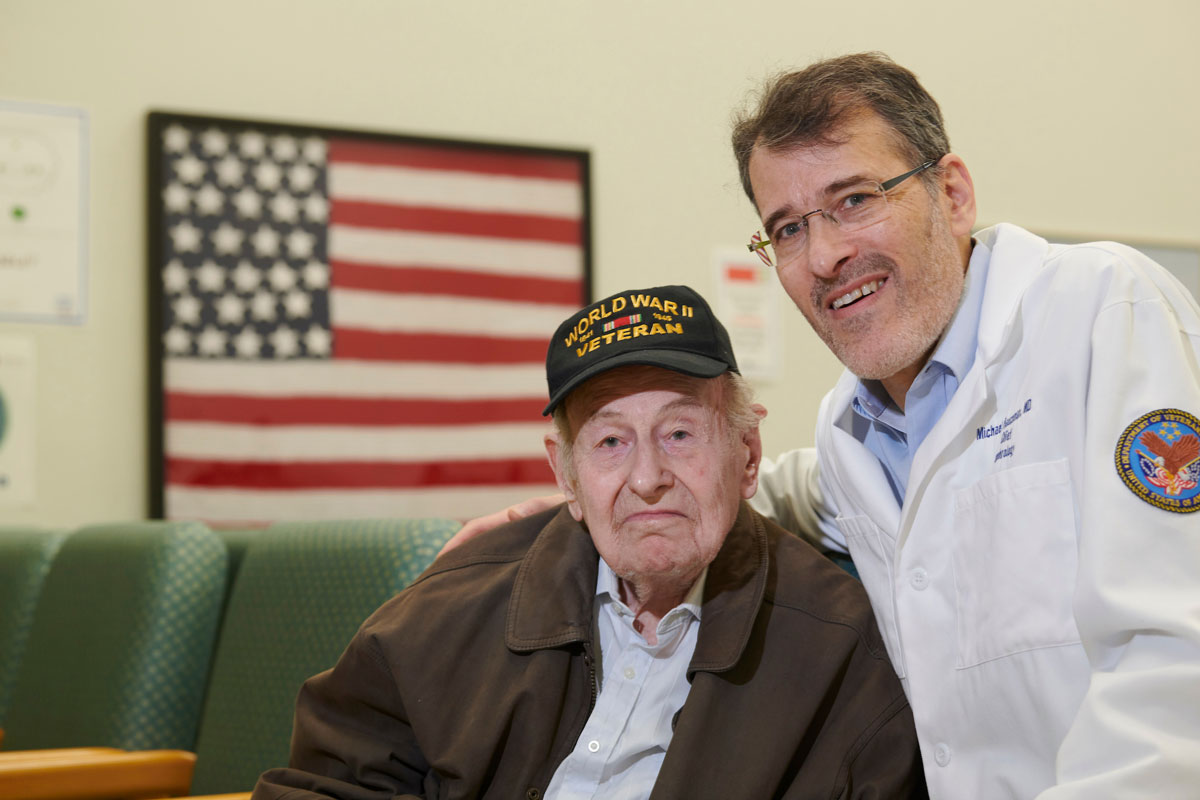Physician whose parents survived Holocaust gratified to treat veterans
Rauchman values contact with veterans he treats via VA St. Louis Health Care System
 Tim Parker
Tim ParkerThe son of Holocaust survivors, Michael Rauchman, MD, (left) a professor of medicine at Washington University School of Medicine in St. Louis, said his family history inspired him to become a physician and treat military veterans. Also the chief of nephrology with the Veterans Affairs St. Louis Health Care System, Rauchman is shown during an appointment this month with World War II veteran Ben Weintraub, who helped liberate a concentration camp in 1945.
Michael Rauchman, MD, is Canadian, but his mother and father raised him to honor America, too.
As a child, he learned that the U.S. military had played a key role in the defeat of Nazi Germany during World War II, allowing Rauchman’s Jewish parents to survive the Holocaust.
Both had been imprisoned in concentration and slave labor camps: Rauchman’s mother, taken in 1941 at age 12 from her house in Romania to a camp in Transnistria, today a breakaway state that borders Moldova and Ukraine; his father, taken in 1944 at age 18 from his home in Czechoslovakia to three slave labor camps in Hungary. His parents survived starvation, typhoid fever and the debilitating loss of family and friends shot and gassed by Nazis.
Rauchman’s family history helped inspire his career as a physician and chief of nephrology with the Veterans Affairs (VA) St. Louis Health Care System, which has been affiliated with Washington University School of Medicine in St. Louis since 1946.
“Treating war heroes who have risked their lives for people in America and abroad is one of my most gratifying experiences,” said Rauchman, a Washington University professor of medicine who oversees a lab on the Medical Campus researching kidney function and regeneration. “For my parents and other prisoners, every day World War II continued meant an increased death risk. My parents emphasized that without the U.S. military, who knows what would have been their fate. My parents never forgot this, and neither did I.”
Washington University physicians and scientists command a major presence in clinical care and research within the VA St. Louis Health Care System, which includes the John Cochran and Jefferson Barracks divisions and various outpatient clinics. Rauchman is one of 120-plus School of Medicine physicians from numerous specialties who help treat 49,000 veterans in the St. Louis region each year. He also represents part of the university’s research arm at VA facilities that receives more than $35 million in grants annually, including from the National Institutes of Health (NIH).
“It is particularly meaningful for me to be able to care for World War II vets,” added Rauchman, 60. “Some are willing to share their wartime experiences, which I appreciate. More importantly, caring for them has given me the opportunity to thank them personally for their service.”
 Tim Parker
Tim ParkerMore than 16.1 million men and women served in World War II between 1941 and the war’s end in 1945, according to the U.S. Department of Veterans Affairs. During that time, 405,399 Americans died from combat, and 670,846 suffered injuries.
Rauchman treats most of his WWII patients for chronic kidney disease, age-related conditions and war injuries. “One patient still had the effects of frostbite he experienced during his service,” the physician said. “He was in his 90s and still learning to adapt to a permanent foot disability caused by the frostbite.”
Rauchman also makes a point to ask veterans about their coping skills and mental health. “Their courage is enormous; however, many haven’t forgotten the death and trauma. I always ask about their service, but I’ve found many to be subdued about it. They don’t want to relive it.”
It took three years of doctor appointments for former U.S. Army soldier Ben Weintraub, 94, of Olivette, Mo., to share with Rauchman any war memories. Under the leadership of Gen. George S. Patton, Weintraub helped defeat the Nazis during the deadly, six-week Battle of the Bulge in Belgium from December 1944 to January 1945. It was the largest battle on Europe’s Western Front.
Weintraub also helped liberate the Mauthausen concentration camp in northern Austria. It was one of the oldest and most brutal camps, according to historians. For 12 hours a day, Nazi soldiers forced the prisoners to carry 110-pound granite boulders up 186 steps, known as the “Stairs of Death.” An estimated 122,766 to 320,000 people died at Mauthausen before it was liberated May 5, 1945.
At age 19, Weintraub, who is Jewish, entered the camp on a tank. He loaded shells into guns as he witnessed the aftermath of atrocities that had been committed there. “I saw piles of dead bodies, living skeletons, people lying in holes and stacked onto bunks four beds high,” he recalled in sputtered whispers. “The German enemies dispersed when we arrived. Some disappeared into hideouts, others were captured. It upsets me to think about it.”
After the war, Weintraub returned to his native St. Louis, where he earned a degree in electrical engineering from Washington University in 1949, and married his wife, Rosetta, in 1952. The couple went on to have two daughters and a son. “I’ve had a good life,” he said. “I am proud to have served my country, but I don’t like to remember the war.”
Rauchman’s mother and father insisted he never forget the sacrifices made by Weintraub and other veterans. “My parents took every opportunity to remind me how fortunate I am to live in a free country,” he said. “My mother, in particular, tolerated no one who criticized America. This included strangers. She had no problem interrupting them and saying, ‘If not for the Americans, you might not be here today.’ ”
After the war, Rauchman’s parents immigrated to Montreal, which became home to the world’s third-largest population of Holocaust refugees. Strangers when they arrived in Canada, his parents met and married. They celebrated their 55th anniversary before Rauchman’s father died in 2008. His mother died this past summer.
Rauchman recounted one of her often-told stories: “When my mother and her parents moved to Canada, her father first worked as a security guard. This upset my mother because he was a University of Vienna-educated lawyer who spoke seven languages. But my grandfather reminded her why they were in Canada: ‘I can walk out on the street and yell that the prime minister is an idiot. No one will arrest me or shoot me. You live in a free country. Don’t ever forget that.’
“My mother didn’t,” he said. “And neither have I.”
 Tim Parker
Tim Parker






